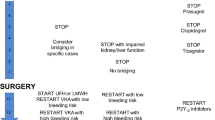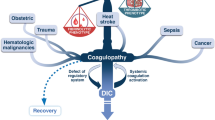Summary.
Patients under oral anticoagulation with coumarin derivatives have a variable perioperative thromboembolic risk which necessitates continuation of their thromboembolic prophylaxis during elective and emergency surgery. Because of their better handling unfractionated heparin and low-molecular-weight heparins are used most often for this purpose. The overlapping effect of coumarin and heparin therapy requires a close daily monitoring of the clotting inhibition (partial thromboplastin time, thromboplastin time, thrombin time). In elective surgery coumarin therapy is interrupted 2–3 days preoperatively; in emergency cases vitamin K or fresh frozen plasma have to be substituted. Patients under heparin therapy or prophylaxis are easier to handle, because the effect of heparin disappears in a few hours after stopping the treatment. In the immediate postoperative phase the heparin application is interrupted for 6 h because of increased bleeding risk. It is important to take into account additional risk factors like the underlying disease, disturbances of platelet function, liver diseases and renal insufficiency.
Zusammenfassung.
Patienten unter einer oralen Langzeitanticoagulation mit Cumarinpräparaten haben ein unterschiedlich hohes perioperatives Thromboembolierisiko, das eine Fortführung der Prophylaxe erfordert. Dies geschieht wegen der besseren Steuerbarkeit in der Regel durch unfraktioniertes Heparin oder niedermolekulare Heparine. Der überlappende Effekt von Cumarin- und Heparintherapie erfordert eine engmaschige tägliche Überwachung der Gerinnungshemmung (PTT, Thromboplastinzeit, Thrombinzeit). Bei Elektiveingriffen wird die Cumaringabe 2–3 Tage präoperativ abgesetzt, bei Notfalleingriffen ergibt sich die Notwendigkeit einer Vitamin K- oder Fresh Frozen Plasma-Substitution. Operationen bei Patienten unter einer Heparintherapie oder -prophylaxe sind unproblematischer, da der Heparineffekt bei Absetzen innerhalb weniger Stunden abklingt. Postoperativ wird die Therapie wegen erhöhter Blutungsgefahr für 6 Stunden unterbrochen. Wichtig ist die Beachtung zusätzlicher Risikofaktoren (Grunderkrankung, Thrombozytenfunktionsstörungen, Leber- und Niereninsuffizienz).
Similar content being viewed by others
Author information
Authors and Affiliations
Rights and permissions
About this article
Cite this article
Encke, A. Chirurgie bei Patienten unter Anticoagulation bei Notfall- und Elektivbedingungen. Chirurg 68, 670–674 (1997). https://doi.org/10.1007/s001040050251
Issue Date:
DOI: https://doi.org/10.1007/s001040050251




